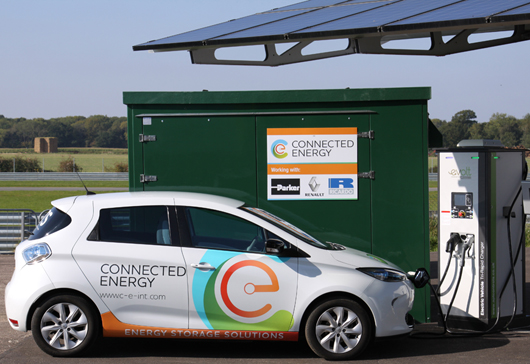 As the number of EVs in use on the highway increases, local electrical distribution networks will be subjected to additional loads as users seek to recharge their vehicles using existing domestic and workplace supplies. Moreover, for convenience, many EV users are likely to require fast charging at capacities above those available from such connections.
As the number of EVs in use on the highway increases, local electrical distribution networks will be subjected to additional loads as users seek to recharge their vehicles using existing domestic and workplace supplies. Moreover, for convenience, many EV users are likely to require fast charging at capacities above those available from such connections.
The FTS E-STOR concept is a charging solution that provides significantly improved functionality for the EV driver while also reducing peak demand on the distribution network. It achieves these twin benefits by reusing EV batteries in a ‘second life’ application as an energy buffer for charging. This provides a robust and cost-effective solution that enables higher capacity EV fast-charging from a standard 3 kW electrical connection. In addition to avoiding additional stress upon the local distribution network, E-STOR can also play an important role as part of a smart grid, in acting as a useful energy buffer to absorb surplus generating capacity, something that is particularly attractive as the intermittent renewable proportion of the generating mix increases.
E-STOR is a modular and expandable energy storage platform and will be launched initially with two products; the E-STOR 50 and E-STOR 100, providing respectively 50 kWh and 100 kWh storage. The second life EV batteries used for these products make the E-STOR platform highly cost-effective. While the system is designed to be battery agnostic, the high capacity lithium-ion units currently being used are derived from Renault EVs, representing an attractive reuse opportunity between on-road use and eventual end of life recycling.
Ricardo’s support for FTS has included the implementation of interface and communication stacks to facilitate FTS application software. This included developing and testing the various commutation protocols to link the multiple energy storage systems and power electronics on the E-STOR architecture. Ricardo developed the TCP/Modbus, CAN, RS 485 and Ethernet communications and selected the appropriate control system hardware to implement the E-STOR application software. The company’s expertise in embedded software and hardware ensured a robust product development cycle.
“We are pleased to have assisted FTS on the development of this important product,” said head of Ricardo hybrid & electric systems Stephen Doyle. “Ricardo has worked with a range of charging station developers on systems that aim to balance the convenience of EV charging that owners require, while also attempting to avoid stress on the local distribution network. The FTS E-STOR product is attractive as it achieves this by energy buffering using second life batteries rather than relying simply on demand management, thus offering a highly practical and more sustainable solution.”
“We plan to install our first commercial E-STOR units in mid-2016, with a network operating by the end of the year,” added FTS managing director Matthew Lumsden. “This will provide EV infrastructure operators with a real choice, with much enhanced rapid-charging capacity on existing electrical connections. But our ambitions for this system are much more than this: We are also pursuing other R&D opportunities both for the E-STOR range and for other bespoke fleet based charging solutions. Whatever the EV charging requirement, FTS aims to provide product innovation and consultancy support.”







